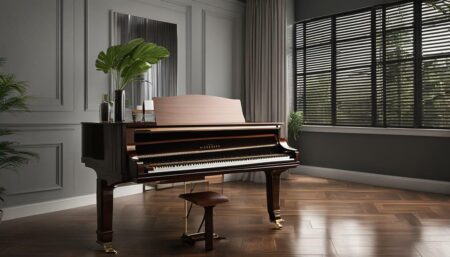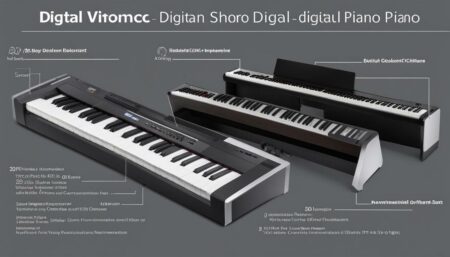Weighted piano keys are a popular feature found in many modern digital pianos. These keys are designed to mimic the feel of a traditional acoustic piano, where the keys have a certain amount of weight to them. This weight is meant to simulate the resistance that is felt when playing a real piano, allowing for a more authentic playing experience.
Understanding Weighted Piano Keys
Weighted piano keys work by using a mechanism that adds weight to each key. This weight is usually achieved through the use of small weights or springs that are placed inside the key mechanism. When a key is pressed, the weight or spring is compressed, creating resistance that simulates the feel of a real piano key.
Benefits of Weighted Keys
The benefits of weighted piano keys are numerous. For one, they allow for a more realistic playing experience, which can be especially beneficial for beginners who are just learning how to play. Additionally, weighted keys can help to build finger strength and dexterity, which can be helpful for more advanced players. Finally, weighted keys can make it easier to transition from playing a digital piano to playing an acoustic piano, since the feel of the keys will be more similar.
Key Takeaways
- Weighted piano keys simulate the resistance felt when playing a real piano, allowing for a more authentic playing experience.
- Weighted keys can help to build finger strength and dexterity, making them beneficial for beginners and advanced players alike.
- Weighted keys can make it easier to transition from playing a digital piano to playing an acoustic piano, since the feel of the keys will be more similar.
Understanding Weighted Piano Keys
Weighted piano keys are an essential component of a keyboard. They are designed to mimic the feel of a traditional piano, where the keys have a certain amount of weight and resistance. This section will discuss the mechanics of weighted keys and the types of weighted keys that are available.
Mechanics of Weighted Keys
The action of a piano is the mechanism that translates the motion of the keys into sound. Weighted keys are designed to mimic the feel of a traditional piano. When a key is pressed, it activates a control that causes a hammer to strike a string. The resistance of the key is determined by the action, which is responsible for the feel of the weighted keys.
There are two types of action: hammer action and non-hammer action. Hammer action is the most common type of action found in weighted keys. It uses a hammer to strike the string, which creates a more realistic feel. Non-hammer action uses a different mechanism to create sound and is typically found in less expensive keyboards.
Types of Weighted Keys
There are two types of weighted keys: semi-weighted and fully-weighted. Semi-weighted keys have a lighter touch and are typically found in synthesizers and MIDI controllers. They are designed to be more responsive to the touch and are ideal for playing fast passages.
Fully-weighted keyboards have a heavier touch and are designed to mimic the feel of a traditional piano. The keys are weighted to provide resistance, and the action is designed to create a more realistic feel. They are ideal for playing classical music and are the preferred choice of professional pianists.
Unweighted keys are also available, but they do not have the same feel as weighted keys. They are typically found in less expensive keyboards and are not suitable for playing classical music.
Graded weight is another feature that is found in some keyboards. This means that the keys are weighted differently, with the lower keys being heavier and the higher keys being lighter. This creates a more realistic feel and is ideal for playing classical music.
In conclusion, weighted keys are an essential component of a keyboard. They are designed to mimic the feel of a traditional piano and are available in semi-weighted and fully-weighted versions. The action of the keyboard is responsible for the feel of the keys, and graded weight is a feature that is found in some keyboards.
Benefits of Weighted Keys
Weighted keys have become increasingly popular in modern pianos, and for good reason. They offer several benefits that can improve the playing experience for both beginners and experienced players. In this section, we will explore the benefits of weighted keys and how they can enhance the playing experience.
For Beginners
Weighted keys are an excellent tool for beginners who are just getting started with the piano. They provide a touch and sensitivity that is similar to that of an acoustic piano, which can help beginners develop proper finger technique and strength. Additionally, practicing on a weighted keyboard can help beginners build finger strength, which is essential for playing more complex pieces.
For Performance
Weighted keys are also beneficial for experienced players who are looking to improve their performance. They provide a level of responsiveness that is unmatched by non-weighted keyboards, allowing for a wider dynamic range and better articulation. This can be especially beneficial for playing pieces that require a high level of precision and control.
Weighted keys also offer a more natural playing experience, which can help musicians better connect with the music they are playing. This is because the weight of the keys provides a tactile feedback that is similar to that of an acoustic piano, making it easier to express emotions and convey the intended mood of the piece.
In conclusion, weighted keys offer several benefits that can improve the playing experience for both beginners and experienced players. They provide a level of touch, sensitivity, and responsiveness that is unmatched by non-weighted keyboards, making them an essential tool for any serious pianist.
Weighted Keys in Different Pianos
Acoustic Pianos
Acoustic pianos have been around for centuries and are known for their rich, warm sound. These pianos have hammers that strike the strings, creating the sound that we hear. The keys on an acoustic piano are weighted to provide the player with a realistic feel. The weight of the keys varies depending on the type of piano. For example, a concert grand piano will have heavier keys than a baby grand piano.
Digital Pianos
Digital pianos are designed to mimic the sound and feel of an acoustic piano. These pianos use electronic circuits to create sound instead of hammers and strings. The keys on a digital piano are also weighted to provide a realistic feel. The weight of the keys can be adjusted to suit the preferences of the player. Some digital pianos also come with features such as touch sensitivity and aftertouch.
Keyboards and Synthesizers
Keyboards and synthesizers are popular among musicians and producers. These instruments are designed to create a wide range of sounds and are not limited to just piano sounds. Keyboards and synthesizers come in a variety of sizes and shapes, and the weight of the keys can vary depending on the model. Some keyboards and synthesizers have weighted keys, while others have semi-weighted or unweighted keys.
When it comes to different brands, Yamaha is known for producing high-quality digital pianos and keyboards. The Yamaha P-125 is a popular digital piano that features weighted keys and a range of other features. Korg is another brand that produces high-quality keyboards and synthesizers. The Kawai ES120 is a popular digital piano that features weighted keys and a range of other features. Roland is another brand that produces high-quality digital pianos and keyboards. The Roland FP-30 is a popular digital piano that features weighted keys and a range of other features. Alesis Recital is a popular keyboard that features 88 weighted keys.
In conclusion, weighted keys provide a more realistic playing experience and are found in a variety of pianos and keyboards. Whether you are a beginner or a professional, finding an instrument with weighted keys can help improve your playing and enhance your overall experience.
Additional Features of Weighted Key Instruments
Weighted key instruments are designed to simulate the feel of an acoustic piano. They offer a range of features that enhance the playing experience and make them a popular choice for pianists of all levels. Here are some additional features of weighted key instruments:
Sound and Effects
Weighted key instruments come with a variety of sound and effects options. They often include reverb, chorus, and other effects that can be adjusted to create different sounds. Some models also have a two-way speaker system that provides a more immersive sound experience.
Connectivity and Portability
Many weighted key instruments have USB connectivity, which allows you to connect them to your computer and use them as a MIDI controller. They are also portable, which makes them easy to transport to gigs or rehearsals.
Accessories
Weighted key instruments often come with accessories such as a sustain pedal, headphones, and an amplifier. These accessories can enhance the playing experience and make it more enjoyable.
In terms of sound quality, weighted key instruments use a sound engine to produce piano sounds. The CF sound engine is a popular choice for many models, as it provides high-quality grand piano sounds. Some models also include samples of other instruments, such as strings, to add variety to your playing.
Overall, weighted key instruments are a great choice for pianists who want to replicate the feel of an acoustic piano. They offer a range of features that enhance the playing experience and make them a versatile instrument for a variety of musical styles.
Choosing a Weighted Key Piano
When it comes to choosing a weighted key piano, there are a variety of factors to consider, including budget and technology. Here are some things to keep in mind when making your decision.
Budget Considerations
For many musicians, budget is a major consideration when choosing a weighted key piano. Fortunately, there are a variety of affordable options on the market that still offer high-quality sound and touch. The Casio Privia PX-160, for example, is a popular choice for budget-conscious players. It offers realistic hammer action keys and a range of sounds and features, all for a relatively low price.
Technology and Brands
When it comes to technology and brands, there are a few key players in the market. Yamaha, Korg, and Roland are all well-known brands that offer high-quality digital pianos with weighted keys. These brands often use advanced technology to create realistic sound and touch, making them a popular choice among concert musicians and keyboard players.
One technology to keep an eye out for is “graded hammer action,” which mimics the feel of a traditional piano. This technology can be found in many Yamaha models, such as the Yamaha P-45, which is a popular choice among beginners and professionals alike.
Ultimately, the best digital piano with weighted keys will depend on your individual needs and preferences. Consider your budget, the technology you want, and the brands you trust, and you’re sure to find a piano that meets your needs.
Frequently Asked Questions
How can you determine if a keyboard has weighted keys?
To determine if a keyboard has weighted keys, one can check the specifications of the instrument. Weighted keys are usually mentioned in the product description or listed as a feature. Additionally, one can test the keys by playing the instrument. Weighted keys will feel heavier and more resistant to touch compared to non-weighted keys.
What are the benefits of weighted keys on a digital piano?
Weighted keys on a digital piano simulate the feel of an acoustic piano. This allows for more expressive playing and better control over dynamics. Weighted keys also help develop finger strength and technique, making it easier to transition to an acoustic piano.
What is the difference between weighted keys and touch-sensitive keys?
Weighted keys provide resistance and weight, simulating the feel of an acoustic piano. Touch-sensitive keys, on the other hand, respond to the force of the player’s touch, producing different volumes depending on how hard or soft the keys are pressed. While both features can be found on digital pianos, weighted keys are generally considered more important for a realistic piano playing experience.
What are some of the best digital pianos with weighted keys?
Some popular digital pianos with weighted keys include the Yamaha P-125, Roland FP-30, and Kawai ES120. These instruments offer a realistic piano playing experience and are suitable for both beginners and advanced players.
Is it important to have weighted keys on a beginner keyboard?
While it is not necessary for a beginner keyboard to have weighted keys, it is recommended. Weighted keys help develop proper technique and finger strength, which can be beneficial in the long run. However, it is ultimately up to the individual player to decide what features they prioritize in a keyboard.
What are the advantages of a weighted keyboard over an unweighted keyboard?
A weighted keyboard offers a more realistic piano playing experience, allowing for more expressive playing and better control over dynamics. Weighted keys also help develop proper technique and finger strength. Unweighted keyboards, on the other hand, are generally more portable and affordable.






